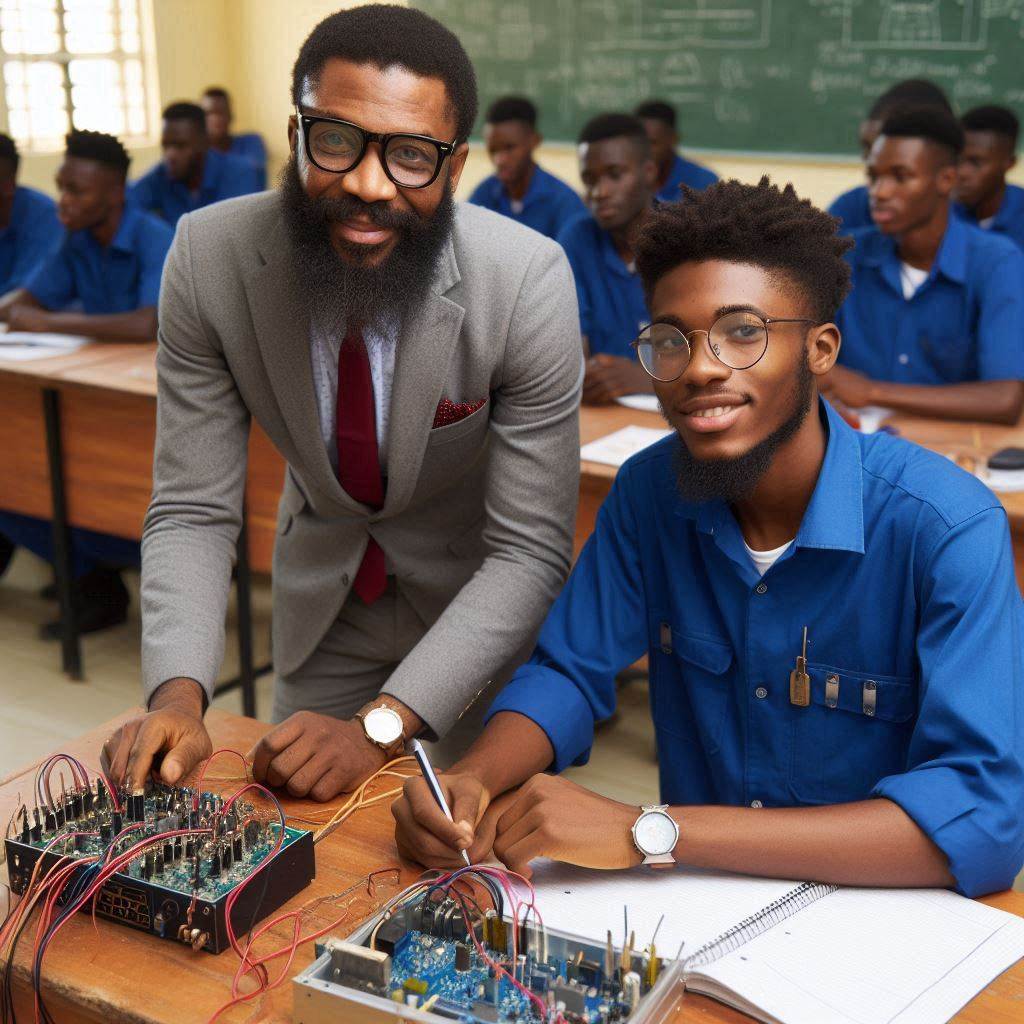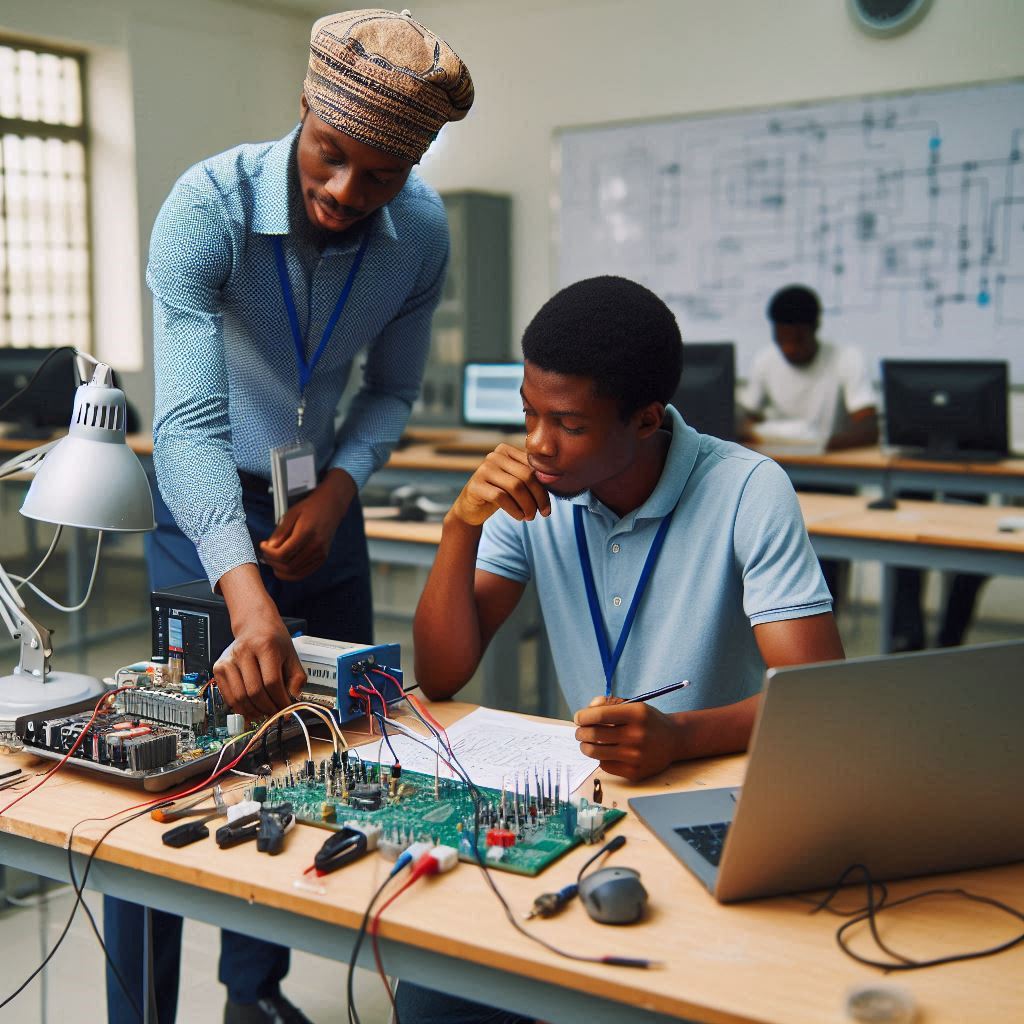Introduction
Inclusive education is crucial for creating an equitable society where all individuals have access to quality education.
Teachers play a vital role in implementing inclusive education practices and strategies.
Proper teacher training is essential to equip educators with the necessary knowledge and skills to support diverse learners effectively.
In Nigeria, teachers face challenges such as lack of training in inclusive education, limited resources and support, and negative attitudes towards inclusive practices.
Without adequate training, teachers may struggle to meet the needs of students with disabilities or special needs.
Additionally, the lack of inclusive education training can lead to exclusion and marginalization of students who require additional support.
By investing in teacher training for inclusive education, schools can create a more inclusive and supportive learning environment for all students.
Training programs should focus on understanding diverse learners, adapting teaching strategies, creating inclusive classroom environments, and collaborating with other professionals.
Ultimately, teacher training for inclusive education is a crucial step towards promoting diversity, equity, and inclusion in schools.
It is essential for educators to continuously enhance their skills and knowledge to meet the needs of all learners effectively.
Importance of Inclusive Education
Inclusive education is the practice of educating students with disabilities alongside their non-disabled peers.
It plays a crucial role in creating a more equitable society by promoting diversity and acceptance.
Benefits of inclusive education for students with disabilities
- Enhanced social skills and relationships
- Improved academic outcomes
- Increased self-esteem and confidence
- Greater opportunities for future employment
Challenges in Implementing Inclusive Education
- Lack of teacher training and support
- Limited resources and funding
- Negative attitudes and stereotypes towards disability
- Resistance from parents and school staff
The Role of Teacher Training in Inclusive Education
- Teachers need specialized skills and knowledge to effectively support students with disabilities.
- Training helps educators create inclusive classrooms that cater to the diverse needs of all learners.
- Professional development enhances teachers’ ability to adapt instruction and provide accommodations.
- Continuous training ensures that educators stay up-to-date with best practices in inclusive education.
Strategies for Effective Teacher Training in Inclusive Education
- Provide ongoing professional development workshops and seminars.
- Offer mentorship programs for new teachers to learn from experienced educators.
- Incorporate inclusive education modules in teacher training programs.
- Collaborate with special education experts and professionals for insights and guidance.
The Impact of Teacher Training on Inclusive Education
- Well-trained teachers are better equipped to create inclusive learning environments.
- Effective training leads to improved academic outcomes and social integration for students with disabilities.
- Educators play a critical role in shaping attitudes and perceptions towards inclusion within schools and communities.
In essence, teacher training is essential for the successful implementation of inclusive education.
By equipping educators with the necessary skills and knowledge, we can create a more inclusive and equitable society for all learners.
Read: Impact of Technology on Chemistry Education in Nigeria
Current State of Teacher Training in Nigeria
The current state of teacher training in Nigeria is crucial for the successful implementation of inclusive education.
Here, we will discuss the existing teacher training programs in Nigeria and evaluate their effectiveness in preparing teachers for inclusive education.
Existing teacher training programs in Nigeria
- Federal College of Education: This institution offers various teacher training programs to equip educators with the necessary skills and knowledge.
- Nigerian Teachers’ Institute: NTI provides training for teachers at different levels to improve their teaching practices.
- State Colleges of Education: These colleges offer teacher training programs that focus on specific subject areas and teaching methodologies.
- Universities: Many universities in Nigeria also offer teacher training programs at the undergraduate and postgraduate levels.
- In-Service Training: Teachers in Nigeria also receive in-service training to update their skills and knowledge in inclusive education.
The effectiveness of these programs in preparing teachers for inclusive education
- Curriculum: The curriculum of teacher training programs in Nigeria should be revamped to include modules on inclusive education.
- Pedagogical Approaches: The effectiveness of teacher training programs can be enhanced by incorporating diverse pedagogical approaches.
- Practical Experience: Hands-on experience and practical training should be an essential component of teacher training programs.
- Professional Development: Continuous professional development opportunities should be provided to teachers to enhance their skills in inclusive education.
- Collaboration: Collaboration between teacher training institutions, schools, and the government is essential to ensure effective teacher preparation for inclusive education.
In fact, the current state of teacher training in Nigeria is essential in shaping the future of inclusive education.
By improving existing programs and enhancing their effectiveness, we can ensure that teachers are adequately prepared to meet the diverse needs of all students in the classroom.
Read: Role of Private Sector in Enhancing Chemistry Education

Areas of Improvement in Teacher Training
When it comes to teacher training for inclusive education, there are several areas that current programs fall short in addressing.
It is crucial to identify these specific areas in order to improve the quality of training and better equip teachers to meet the needs of all students.
Lack of focus on diversity
Many teacher training programs do not adequately address the diverse needs of students in inclusive classrooms.
Teachers need to be trained to understand and appreciate the unique abilities and challenges of each student.
Specialized training in cultural competence and sensitivity is essential for creating an inclusive learning environment.
Limited understanding of inclusive practices
Teachers often lack the knowledge and skills needed to effectively implement inclusive practices in their classrooms.
There is a need for specialized training in strategies for differentiating instruction and supporting diverse learners.
Teachers must be equipped with the tools to create inclusive lesson plans and activities that address the needs of all students.
Insufficient support for students with disabilities
Teacher training programs often do not provide teachers with the necessary knowledge and skills to support students with disabilities.
There is a need for specialized training in creating individualized education plans (IEPs) and implementing accommodations and modifications.
Teachers must be prepared to work collaboratively with special education professionals and support staff to meet the needs of students with disabilities.
Limited resources and access to professional development
Many teachers do not have access to ongoing professional development opportunities to enhance their knowledge and skills in inclusive education.
There is a need for more resources and training programs that focus specifically on inclusive practices and strategies.
Teachers must have access to mentors, workshops, and conferences to continually improve their practice and stay up-to-date on best practices in inclusive education.
Inadequate support for behavior management
Teachers often struggle with managing behavior in inclusive classrooms and may not have the training or resources to effectively address challenging behaviors.
There is a need for specialized training in positive behavior support and de-escalation techniques to create a positive and supportive learning environment for all students.
Teachers must be prepared to work collaboratively with behavior specialists and support staff to address the behavior needs of students in inclusive classrooms.
In short, addressing the areas of improvement in teacher training for inclusive education is crucial for creating an inclusive learning environment where all students can succeed.
By identifying these specific areas and implementing specialized training programs, we can better equip teachers to meet the diverse needs of students and create a more inclusive and supportive educational experience for all.
Read: Enhancing Teacher Quality in Nigeria
Transform Your Career with Expert Guidance
Get personalized mentorship consulting that’s tailored to your unique path. Our expert advice is actionable and exclusive.
Get StartedStrategies for Enhancing Teacher Training
When it comes to improving teacher training for inclusive education, there are several strategies that can be implemented to ensure teachers are equipped with the necessary skills and knowledge to support diverse learners effectively.
- Professional Development Programs: Organize regular workshops and training sessions for teachers to enhance their understanding of inclusive education practices.
- Peer-to-Peer Learning: Encourage collaboration among teachers, where more experienced educators can mentor and support their colleagues in implementing inclusive strategies.
- Use of Technology: Integrate technology into teacher training programs to provide interactive and engaging learning experiences for educators.
- Hands-On Learning Activities: Include practical exercises and simulations that allow teachers to practice implementing inclusive strategies in a controlled environment.
- Ongoing Support and Feedback: Provide continuous support to teachers through coaching and feedback mechanisms to help them improve their inclusive practices over time.
- Collaborate with International Partners: Explore successful models from other countries that have proven effective in training teachers for inclusive education, and adapt them to the Nigerian context.
- Engage in Research and Innovation: Encourage teachers to stay updated on the latest research and innovative practices in inclusive education through conferences, seminars, and networking opportunities.
- Promote Diversity and Inclusion: Emphasize the importance of valuing diversity and fostering an inclusive classroom environment through anti-bias education and cultural competency training.
- Create a Supportive School Culture: Develop a school-wide approach to inclusive education that involves all stakeholders, including parents, administrators, and support staff.
By implementing these strategies, teacher training for inclusive education in Nigeria can be significantly enhanced, ultimately leading to improved outcomes for all students, regardless of their background or abilities.
Read: Comparing Chemistry Education: Nigeria vs. Abroad
Collaboration Between Schools and Teacher Training Institutions
Emphasizing the importance of collaboration between schools and teacher training institutions is crucial for promoting inclusive education.
This partnership can greatly enhance the skills and knowledge of teachers in creating a more inclusive learning environment for all students.
- Schools can work closely with teacher training institutions to develop customized training programs that meet the specific needs of their teachers.
By collaborating on curriculum development, schools can ensure that teachers are equipped with the necessary tools and strategies to effectively support students with diverse learning needs. - Teacher training institutions can benefit from partnerships with schools by gaining valuable insights into the challenges and opportunities present in real-world classroom settings.
By receiving feedback from schools, teacher training programs can be continuously improved to better address the evolving needs of teachers. - One effective way in which schools can provide support to teachers undergoing training in inclusive education is by offering mentorship programs.
Pairing novice teachers with experienced educators who have expertise in inclusive practices can help new teachers navigate challenges and build confidence in their abilities. - Schools can also create professional learning communities where teachers can collaborate, share best practices, and problem-solve together.
By fostering a culture of continuous learning and support, schools can create a positive environment where teachers feel empowered to implement inclusive education practices effectively. - Another way schools can support teachers in their training is by providing resources and tools that facilitate the implementation of inclusive strategies in the classroom.
This can include access to assistive technology, specialized training materials, and additional staffing support to meet the diverse needs of students.
Inclusive Teaching Methods and Practices
Innovative Teaching Methods
Implementing innovative teaching methods is essential in promoting inclusive education. Teachers should be trained on various approaches such as:
- Differentiated Instruction: Tailoring lessons to meet individual student needs.
- Co-Teaching: Collaborating with special education teachers to support diverse learners.
- Universal Design for Learning (UDL): Designing lessons to cater to different learning styles.
- Project-Based Learning: Engaging students in hands-on, collaborative projects.
Inclusive Classroom Environments
Creating inclusive classroom environments that cater to diverse learning needs is crucial for student success. Teachers can achieve this by:
- Building Positive Relationships: Establishing rapport with all students to foster a supportive learning environment.
- Using Flexible Seating Arrangements: Allowing students to choose seating that suits their learning style.
- Providing Multiple Means of Representation: Presenting information in various formats to accommodate different preferences.
- Encouraging Collaboration: Promoting teamwork and peer-to-peer learning among students.
By integrating these teaching methods and practices into teacher training programs, educators can better prepare to meet the needs of all learners in inclusive classrooms.
This approach not only benefits students with diverse learning needs but also enhances the overall learning experience for all students.
Assessment and Evaluation of Teacher Training Programs
- Recognize the importance of ongoing assessment and evaluation of teacher training programs.
- Implement feedback mechanisms from teachers and students to measure effectiveness.
- Utilize surveys, interviews, and focus groups to gather feedback on various aspects of training programs.
- Analyze data collected to identify strengths and areas needing improvement in training programs.
- Consider the impact of training programs on student outcomes and overall school climate.
- Collaborate with stakeholders to review assessment results and make data-driven decisions for program enhancements.
- Ensure continuous monitoring and adjustment of training programs based on evaluation findings.
- Promote a culture of reflective practice among teachers to foster ongoing professional growth and development.
Conclusion
Teacher training for inclusive education is crucial for ensuring that all students, regardless of their abilities, have equal opportunities to learn and succeed.
By equipping educators with the necessary knowledge and skills to support diverse learners, we can create a more inclusive and supportive learning environment.
It is imperative for policymakers, educators, and stakeholders to prioritize and invest in continuous teacher training programs in Nigeria.
Only through a collective effort can we ensure that every child receives a quality education that meets their individual needs and fosters their personal growth.




